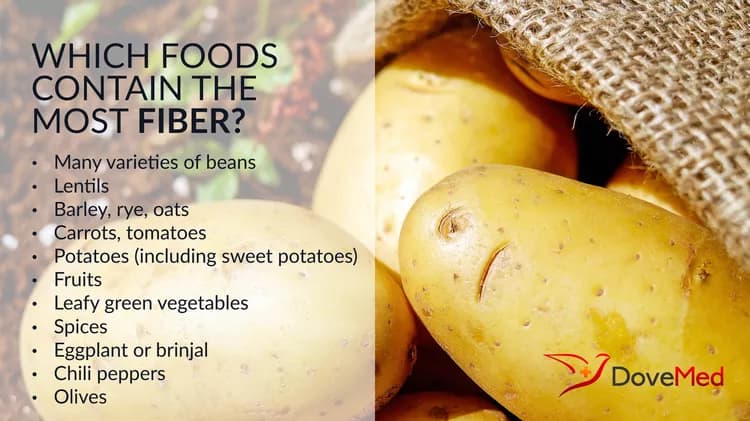Fiber, an important nutrient of our diet, is a carbohydrate that constitutes the indigestible portion (or roughage) of food from plants including grains, vegetables, and fruits. It is a vital component for moving food efficiently through the digestive system and in maintaining a well-balanced diet.
A high consumption of dietary fiber has shown to significantly reduce the risk of developing coronary heart disease, stroke, hypertension, and certain gastrointestinal illnesses. Increased intake of soluble fiber helps improve blood sugar and insulin sensitivity in non-diabetic and diabetic individuals. Fiber supplementation in obese individuals significantly enhances weight loss. Studies have also shown that a high fiber diet, as part of a balanced eating model, may help prevent some long-term diseases such as diverticulitis, constipation, and even some types of cancer.
There are two types of fiber - soluble fiber and insoluble fiber. Soluble fiber dissolves in water to create a gel-like substance, delaying the emptying of the stomach. It is able to bind to the fatty substance cholesterol and promote excretion, which seems to help lower LDL (“bad”) blood cholesterol. Insoluble fiber is known as roughage, because it gives plants their firm structure. Insoluble fiber does not dissolve in water, but acts as a laxative, aiding in the passage of food and waste through the gut. This prevents potentially harmful substances from staying in the intestines. With water, insoluble fiber adds bulk to one’s diet and softness to the stool, thereby preventing constipation.
Sources of soluble fiber include avocados, pears, peas, beans, oats and barley, apples with skin, oranges, prunes, strawberries, broccoli, and cauliflower. Foods that are great sources of insoluble fiber include turnips, beets, cauliflower, cabbage, Brussels sprouts, carrots, whole-wheat products, wheat bran, corn bran, cauliflower, green beans, and broccoli.
Following is a list of plant foods that are high in fiber:
- Many varieties of beans: Navy beans, pinto beans, black beans, lima beans, kidney beans, green beans, etc.
- Lentils
- Barley, rye, oats
- Wheat, buckwheat
- Carrots, tomatoes
- Potatoes (including sweet potatoes)
- Raspberries, cranberries, blueberries, etc.
- Fruits such as strawberries, apples, banana, pineapple, kiwifruit, etc.
- Leafy green vegetables including collard greens, turnip greens, broccoli, spinach, Brussels sprouts, cabbage, asparagus, kale, cauliflower, lettuce, Bok Choy, etc.
- Tempeh
- Dried peas and green peas
- Spices such as cinnamon, fennel, black pepper, cloves, turmeric, etc.
- Eggplant or brinjal
- Celery and parsley
- Chili peppers
- Olives
The amount of total dietary fiber one should consume is between 25-35 grams (not from supplements) per day. The goal is to consume both soluble and insoluble fiber because both are equally important for a well-balanced diet. However, an excess intake of dietary fiber i.e., consuming more than 50-60 grams of fiber per day can reduce the amount of vitamin and mineral absorption in the body. Also, excessive amounts of fiber can result in digestion-related problems such as gas, diarrhea, and abdominal bloating.
Also, any increase to one’s dietary fiber intake should only be gradual, since this may also cause diarrhea and bloating. Additionally, while increasing fiber intake, the amount of water intake should also be proportionately increased. This will help insoluble fiber expand in the stomach and give the feeling of fullness for a longer period of time.
Related Articles
Test Your Knowledge
Asked by users
Related Centers
Related Specialties
Related Physicians
Related Procedures
Related Resources
Join DoveHubs
and connect with fellow professionals


0 Comments
Please log in to post a comment.